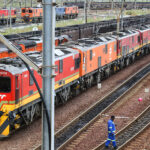E-mobility to the fore!
E-mobility to the fore!
Alternative drivelines are essential if transport emissions are to be lowered, and e-mobility is coming to the fore. In this vein, a new heavy battery-electric truck has started to operate on the roads in the Mälardalen region in Sweden. The electric truck, which can handle loads of up to 64 tonnes, is one of the first of its kind.
Behind the electric truck project are manufacturer Scania, transport and machinery service company Foria, and recycling and environment company Ragn-Sells. “Our new electric truck will be a part of a transport solution that enables a circular system,” explains Fredrik Allard, head of e-mobility at Scania. “Now Foria is able to transport fly ashes from the thermal power station in Mälardalen to Ragn-Sells’ new facilities, where valuable salts can be recycled and reused – and there are no emissions from the truck.”
To accelerate the development of electrified, emission-free heavy transport, Scania, Foria and Ragn-Sells have started a collaboration across industries. Scania has delivered the battery-electric truck, capable of handling loads up to 64 tonnes. Foria is responsible for the truck operations, transporting fly ashes from the Mälardalen region’s thermal power station to be recycled at Ragn-Sells’ new Ash2Salt facility
at Högbytorp, northwest of Stockholm. The battery-electric truck is already operating on the roads between the power station in Mälardalen and Högbytorp, where the fly ashes are currently being stored until the new facility is up and running.
Today, there are several solutions for electrified transport, but most of them are trucks that are not as heavy, covering shorter distances. “This electric truck is a big step and vital for Foria if we are to change to electricity – and in that way change a flow that is built around fossil (fuel). The collaboration with Scania and Ragn-Sells enables us to learn and evaluate future investments in fossil-free technologies,” says Tove Winiger, sustainability manager at Foria.
Once the new facility has opened, the electric truck will work in two shifts to decrease the number of transports operating on fossil fuel. To avoid unnecessary and costly stops, the truck will be fast charged when loading and offloading. At Ragn-Sells’ facility at Högbytorp, the tech company ABB has delivered two highly efficient chargers with a capacity of 160 kW. The intention is that the same opportunity to charge will be available during collection of the fly ash at the thermal power plant.
“What we do with fly ash is one of the largest investments that have been done within circular recycling of materials in Sweden. We are happy that the collaboration with Scania and Foria enables electrified fossil-free transport of fly ash to and from our facility,” says Erik Wastesson, project manager at Ragn-Sells.
This collaboration is a part of Regional Electrified Logistics (REEL), an initiative where leading Swedish companies and organisations accelerate the transition to electrified emission-free transports on the country’s roads. REEL is led by CLOSER, the Swedish platform for transport efficiency, which benefits from the support of the Fordonsstrategisk Forskning och Innovation (FFI) programme to pave the way for the transition to electric freight transport in the Swedish market. Read more about the project here.
Unpacked: the charging units
Chargers are essential to this project – and, indeed, the successful implementation of any electric truck. ABB has supplied two charging units, each with a capacity of 160kW, that are adapted for usage at Högbytorp. These highly efficient chargers enable fast charging, with a broad spectrum of power levels that are well-suited for the charging demand adapted to the electric truck’s operations. The charging
solution has a robust construction, remote diagnostics, and administrative tools that make it possible to operate for long periods of time. Read more about the chargers here
Published by
Focus on Transport
focusmagsa




